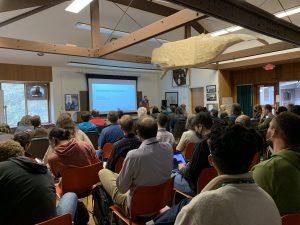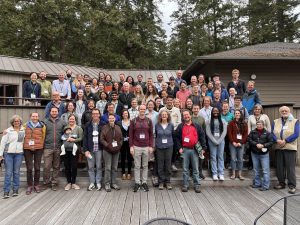Considering Pathways to Net-Zero Emissions at the 2022 PCC Summer Institute
The release of the IPCC’s Sixth Assessment Report in 2021 re-emphasized the need to reach net-zero greenhouse gas emissions in order to stabilize the climate and stop global warming, putting pathways towards net-zero on center stage. Thus, it was not surprising that members of the climate science community attending the annual PCC Winter Welcome voted for “Pathways to Net-Zero Emissions” as the topic for the PCC’s first in-person Summer Institute (SI) since 2019. Our SI held sessions focused around four related themes as well as lighting talks and a poster session where members of the PCC community shared their work. Months of planning, led by Professors Abigail Swann (ATM S/BIOL) and Kyle Armour (ATM S/OCEAN), helped ensure that the event would be informative and engaging for all levels of attendee, including faculty and graduate students across many different institutions, outside researchers, social and communication experts, and even a few undergraduates.

The SI took place over three days, September 14-16th, at the idyllic Friday Harbor Labs on San Juan Island. As in previous years, attendees had time and opportunity to meet, catch-up, and start to explore the theme of net-zero during the carpool from UW to the ferry and while on the ferry itself. The continual sunny skies throughout the event, and during our free afternoon of exploration and conversation, was a treat. As the ongoing pandemic has disrupted these times for community and connection, it became increasingly obvious over the course of the institute how much participants valued this time with colleagues and friends.
Formal sessions began Wednesday evening with a focus on the physical science basis for net-zero emissions. Topics covered included why global warming scales with cumulative carbon emissions; why warming only stops once net-zero is reached; the challenges in defining net zero when considering greenhouse gasses with vastly differing atmospheric lifetimes (e.g., centuries for CO2 versus a decade for methane); and what characteristics are common to emissions pathways that achieve net-zero emissions.
Thursday morning presentations and discussion explored what can be done to reduce greenhouse gas emissions, with topics such as the challenges of scaling renewable energy; how to achieve emissions reduction in municipal planning; and the potential for emissions reductions in the agricultural sector.

After returning from informal conversation while exploring San Juan Island, Thursday evening presentations addressed the role of carbon dioxide removal in reaching net-zero emission. Topics included direct air carbon capture; the potential for natural carbon removal solutions; and the limitations of afforestation and reforestation.
Pathways to net-zero emissions are not simply a scientific endeavor. For us to achieve the change necessary for this goal in an equitable capacity, it will require progress, support, and commitment from all sectors and levels, from state-level politics to federal action to individual and independent actors and investigators. Science can inform our decisions, but for them to actually drive progress, societal change is required. These ideas were explored in our final session on Friday morning on policy opportunities and challenges in achieving net-zero emissions. Topics included global climate policy; how the stringency of state-level climate policies related to greenhouse gas emissions reductions; projections for how 2022’s Inflation Reduction Act will reduce US emissions; how to include equity in just transitions to decarbonization; King County’s efforts to help communities achieve net-zero emissions; and the challenges of forest carbon offset programs in reducing emissions.
Although the Summer Institute may have officially come to a close at lunch on Friday, there was no halt in discussion. Conversations continued during the journey back from Friday Harbor and beyond, with the connections formed being continually built upon as we all collectively work towards addressing climate change. That is why this event is so important. It brings together people from countless places, backgrounds, levels, and specialties to work towards a common goal. And with such an urgent, complex, interdisciplinary issue such as climate change, it is easy to see why so many perspectives are needed for change. The interdependencies of the physical basis of climate change, methods of greenhouse gas reduction, carbon capture and sequestration methods, and implementation strategies are too complex to tackle alone, but with strong tenets of collaboration, our work towards securing pathways to net-zero may one day be achieved.

Talks and discussions followed four themes:
“Physical science basis for net-zero emissions”, speakers Kirsten Zickfeld (Simon Fraser University), David Frame (University of Canterbury), Zeke Hausfather (Berkeley Earth, Stripe Climate)
“Reducing Greenhouse gas emissions”, speakers Daniel Kirschen (UW Clean Energy Institute), Jan Whittington (UW Urban Design and Planning), Sarah Collier (UW Environmental and Occupational Health Sciences)
“Carbon Dioxide Removal”, speakers Alex Gagnon (UW Oceanography), Zeke Hausfather (Berkeley Earth, Stripe Climate), Abigail Swann (UW Atmospheric Sciences, UW Biology)
“Transitions toward net-zero emissions: policy and challenges”, speakers David Reidmiller (Gulf of Maine Research Institute), Parrish Bergquist (Georgetown University), Matt Kuharic (King County), Erin Mayfield (Dartmouth), Lisa Song (ProPublica)
Visit the 2022 Summer Institute event page on our website for more detail.
Thanks to all our speakers and participants for contributing to a week of interesting talks and discussions!
By Abigail Swann (Professor of Atmospheric Sciences and Biology), Kyle Armour (Professor of Oceanography and Atmospheric Sciences), Miriam Bertram (UW PCC Assistant Director), and Isaac Olson (UW PCC Undergraduate Assistant)